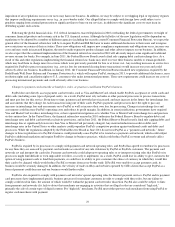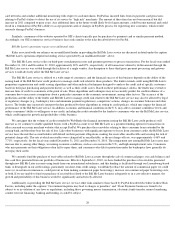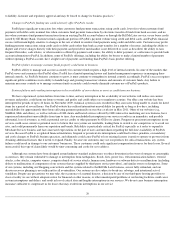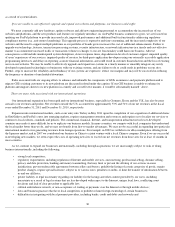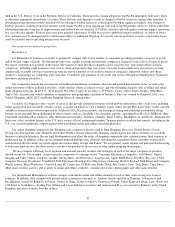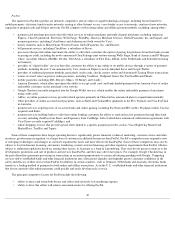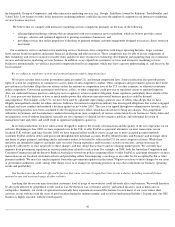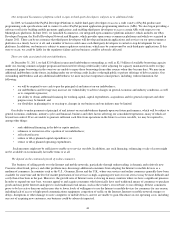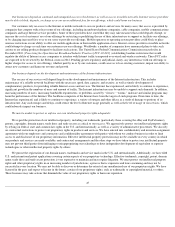eBay 2011 Annual Report Download - page 42
Download and view the complete annual report
Please find page 42 of the 2011 eBay annual report below. You can navigate through the pages in the report by either clicking on the pages listed below, or by using the keyword search tool below to find specific information within the annual report.
value of the equity awards they would receive in connection with their employment. Fluctuations in our stock price may make it more difficult to
retain and motivate employees whose stock option strike prices are substantially above current market prices. Similarly, decreases in the number
of unvested in-the-
money stock options held by existing employees, whether because our stock price has declined, options have vested, or because
the size of follow-on option grants has declined, may make it more difficult to retain and motivate employees.
Problems with or price increases by third parties who provide services to us or to our users could harm our business.
A number of parties provide services to us or to our users that benefit us. Such services include seller tools that automate and manage
listings, merchant tools that manage listings and interface with inventory management software, storefronts that help our users list items, caching
services that make our sites load faster and shipping providers that deliver goods sold on our platform, among others. In some cases we have
contractual agreements with these companies that give us a direct financial interest in their success, while in other cases we have none. PayPal is
dependent on the processing companies and banks that link PayPal to the payment card and bank clearing networks. Similarly, Bill Me Later relies
on an unaffiliated lender in providing the Bill Me Later service and also relies heavily on third parties to operate its services, including merchant
processors and payment gateways to process transactions. Financial or regulatory issues, labor issues (e.g., strikes or work stoppages) or other
problems that prevent these companies from providing services to us or our users could reduce the number of listings on our websites or make
completing transactions or payments on our websites more difficult, thereby harming our business.
In addition, price increases by, or service terminations, disruptions or interruptions at, companies that provide services to our users and
clients (such as postal and delivery services) could also reduce the number of listings on our websites or make it more difficult for our sellers to
complete transactions or for us to timely fulfill and ship products sold on the websites operated by GSI's clients, thereby harming our business.
The U.S. Postal Service has announced that it is considering closing thousands of local post offices and ending Saturday mail delivery. While we
continue to work with global carriers to offer our sellers a variety of shipping options and to enhance our shipping experience, these closures could
require certain sellers to utilize alternatives which could be more expensive or inconvenient, which could in turn decrease the velocity of trade on
our site, thereby harming our business. In addition, any security breach at a company providing services to our users could also adversely affect
our customers and harm our business.
In addition, we have outsourced certain functions to third-party providers, including customer support and product development functions,
which are critical to our operations. If our service providers do not perform satisfactorily, our operations could be disrupted, which could result in
user dissatisfaction and adversely affect our business, reputation and operating results.
Although we generally have been able to renew or extend the terms of contractual arrangements with, or if necessary replace, third parties
who provide services to us on acceptable terms, there can be no assurance that we will continue to be able to do so in the future. If any third
parties were to stop providing services to us on acceptable terms, including as a result of bankruptcy due to poor economic conditions, we may be
unable to procure alternatives from other third parties in a timely and efficient manner and on acceptable terms, or at all. In addition, there can be
no assurance that third parties who provide services directly to our users will continue to do so on acceptable terms, or at all.
Customer complaints or negative publicity about our customer support or anti-fraud measures could diminish use of our services.
Customer complaints or negative publicity about our customer support could severely diminish consumer confidence in and use of our
services. Measures that we sometimes take to combat risks of fraud and breaches of privacy and security have the potential to damage relations
with our customers or decrease activity on our sites by making our sites more difficult to use or restricting the activities of certain users. These
measures heighten the need for prompt and accurate customer support to resolve irregularities and disputes. Effective customer support requires
significant personnel expense, and if not managed properly, this expense could significantly impact our profitability. Failure to manage or train
our own or outsourced customer support representatives properly could compromise our ability to handle customer complaints effectively.
Negative publicity about, or negative experiences with, customer support for any of our businesses could cause our reputation to suffer or affect
consumer confidence in our brands individually or as a whole. Because PayPal is providing a financial service and operating in a more regulated
environment, PayPal must provide both telephone and email customer support and resolve certain customer contacts within shorter time frames.
As part of PayPal's program to reduce fraud losses and prevent money laundering, PayPal may temporarily restrict the ability of customers to
withdraw their funds if those funds or the customer's account activity are identified by PayPal's risk models as suspicious. PayPal has in the past
received negative publicity with respect to its customer support and account restrictions, and has been the subject of purported class action
lawsuits and state attorney general inquiries alleging, among other things, failure to resolve account restrictions promptly. In the second quarter of
2010, two putative class-action lawsuits (Devinda Fernando and Vadim Tsigel v. eBay Inc. and PayPal, Inc.; and Moises Zepeda v. PayPal, Inc.)
were
37


